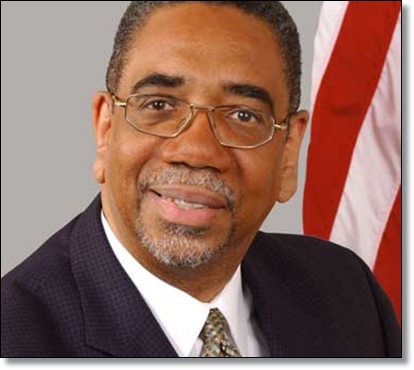US Congress: Warming Up to Africa?

 |
|
Congressman Bobby L. Rush Photo courtesy |
“I wish our late Colleague, Mr Payne would have been here to support this. In his own words, to make a decision in life, we only need to know what is wrong or right and choose the latter. This bill is the Right bill at the right time,” Rush says.
In an article published in The Foreign Policy Magazine of March 19 2012, an author suggested that “China money and man power is behind Africa’s boom.”
“This is no longer a wake-up call for us but a “slap on our face,” observes Congressman Bobby L. Rush. “We have been talking for too long about ‘Africa as the next frontier,’ about trade and investment. It is time to take Action!”
“America businesses are facing serious competition in the African Market, while we have a great opportunity to build mutually beneficial policies that create jobs and economic growth on both continents. Sub-Saharan Africa in particular is expected to have the fastest growing economies in the world over the next five years, with 7 of the 10 fastest-growing economies located in the region. In 2008, Africa’s purchasing power reached $860 billion with a projection to grow upwards of $1.4 trillion in the next 10 years.
For a long time, Africa was a symbol stagnation, war, dictatorship, poverty, and disease. Today, African continent is experiencing a serious reawakening. This legislation will change that wrong perception of the continent by encouraging a greater understanding among U.S. businesses and financial communities of opportunities in Africa, ” Rep Rush adds.
“Africa has never been more important to the US economy than it is now. The opportunities in the African marketplace are growing daily, and if the American private sectors, working with our government, do not take advantage of these opportunities, jobs will be lost for American workers and manufacturers to those countries who do already understand the value of the American marketplace. The American product is highly respected throughout the fifty-four nations of Africa and we must be able to compete. To be able to compete we must have a far more active and greater presence throughout the continent, ” says Stephen Hayes, President and CEO, Corporate Council on Africa.
According to Rep Rush, “With unemployment up, spending down and the value of the dollar dropping, increased mutual trade with Africa is the impetus our economy needs. The competition for jobs is real. The U.S. needs to innovate in the way we conduct our foreign policy. The United States has underestimated China’s posture while failing to develop a coherent strategy to compete, hurting both American business interests and political influence. It is time to act. The tools available to the United States to competitively compete in Africa are scattered, difficult to access, and not effectively coordinated. For too long, the US private sector has been losing ground in Africa to more competitive, government-backed investments from Asia. We need to think more strategically and be more innovation on how to supporting its own investors in Africa – not just from a competitiveness perspective, but from a jobs and development perspective as well.”
Rep Rush is upbeat that the bill will also explore ways that African Diaspora remittances estimated at $ 40 billion yearly and savings estimates at $ 400 billion --can help governments in Africa tackle economic, development, and infrastructure financing needs.
According to Ms. Liesl Riddle, PhD, Associate Dean for MBA Programs and Associate Professor of International Business and International Affairs, School of Business, George Washington University, “Diaspora investment catalyzed China and India into emerging market status. Today African diasporans in the United States are seeking ways to invest in Africa to further economic and social development across the Continent. Passage of this bill will provide many of the tools necessary to successfully channel the Diaspora’s potential for development into Africa, while creating American jobs and opportunity in some of the fastest growing markets of the twenty-first century.”
Commenting on the bill, Rosa Whitaker, President and CEO of the Whitaker Group observes that “There are several US government agencies with similar mandates to support US investment in Africa – OPIC, Ex-Im, Department of Commerce – but our experience on the ground in Africa suggests that a more harmonized, coherent approach is necessary to give US companies a leading edge. Africa is now widely recognized as one of the last true “frontier markets,” and this bill will provide US companies with much-needed support to seize opportunities in these markets.”
“This bill gets 100% support from the National Black Chamber of Commerce, Inc. Not only is it great with the opportunities it presents; it is overdue. We are playing “catch up in Africa and tools like this are just what we need. Also, there are more than 200 million people of African Descent (members of the African Diaspora) who are poised to interact with Africa via trade and investment. This bill, if enacted will encourage them to become more active,” notes Harry C. Alford, President/CEO National Black Chamber of Commerce, Inc.
The bill is expected to reduce non trade barriers, encourage regional integration of African countries, increase U.S export while ensuring that maximizing the positive effects for United States trade, export and labor interests as well as economic development for African countries. The passage of this legislation is intended among other factors to ensure that “…U.S. has policy has made a meaningful contributions to the transformation of Africa allowing it to progress toward fully integrate into the twenty-first century world economy not only as a supplier of primary products but also as full participant in international supply and distribution chains,” in the words of Rep Rush.
For more information, contact:
Renee Ferguson, Renee.Ferguson@mail.house.gov
